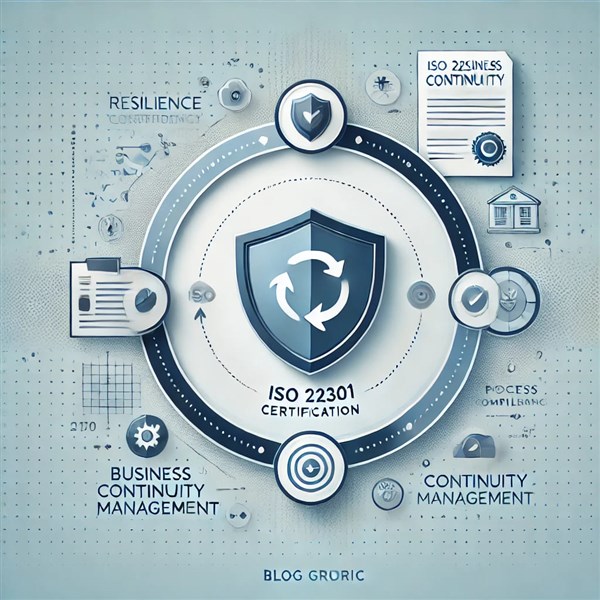
In an increasingly unpredictable global business environment, organizations face a wide range of risks, from natural disasters and cyber-attacks to pandemics and political instability. As businesses grow more dependent on technology and interconnected operations, the need for robust risk management and continuity planning has never been more critical. Achieving ISO 22301 certification is one of the most effective ways to ensure that your organization is prepared to face these risks while maintaining operations with minimal disruption.
ISO 22301, the international standard for Business Continuity Management Systems (BCMS), provides a structured framework for identifying potential threats, assessing their impact, and developing strategies to mitigate those risks. This certification helps organizations safeguard their business interests, reduce downtime, and protect their reputation.
In this blog, we will explore the key benefits of achieving ISO 22301 certification and how it can play a significant role in risk mitigation for businesses.
What is ISO 22301?
ISO 22301 is an internationally recognized standard for business continuity management. It was developed by the International Organization for Standardization (ISO) to help organizations implement, operate, maintain, and improve a business continuity management system (BCMS). It outlines the processes and procedures that organizations should follow to protect themselves against risks and ensure they can recover swiftly from disruptive incidents.
The certification offers a holistic approach to risk management, enabling businesses to anticipate, prepare for, respond to, and recover from disruptive events. Whether an organization faces operational failures, data breaches, supply chain interruptions, or any other unexpected crisis, ISO 22301 ensures that the necessary measures are in place to safeguard its survival and continuity.
1. Enhanced Risk Management
One of the primary benefits of achieving ISO 22301 certification is the significant improvement in risk management practices. The certification process requires organizations to identify potential threats and vulnerabilities in their operations. This comprehensive risk assessment allows businesses to recognize and prioritize risks, ensuring that the most critical aspects of the organization are safeguarded.
The framework helps businesses create a risk mitigation strategy that involves preventive measures, incident response plans, and effective recovery solutions. By developing a structured approach to managing risks, organizations can reduce the likelihood of disruptive incidents and minimize their impact when they occur.
2. Improved Business Continuity Planning
ISO 22301 certification emphasizes the importance of having a business continuity plan (BCP) in place. A well-structured BCP ensures that critical operations can continue with minimal disruption, even in the face of unforeseen challenges. Whether it is a natural disaster, cyber-attack, or supply chain disruption, ISO 22301-certified organizations are equipped to respond efficiently and effectively.
The certification helps organizations map out the necessary actions to maintain operations during a crisis, including communication protocols, roles and responsibilities, and resource allocation. These proactive measures are essential for reducing downtime and ensuring that businesses remain operational even in difficult times.
3. Minimized Downtime and Financial Losses
One of the most immediate consequences of a disruptive event is downtime, which can lead to significant financial losses. For many businesses, even a few hours of inactivity can result in revenue loss, reputational damage, and customer dissatisfaction. ISO 22301 certification focuses on creating strategies that reduce downtime by enabling faster recovery times.
By preparing for the worst-case scenarios, organizations can limit the negative impact of business interruptions. This preparedness not only protects the company’s revenue streams but also preserves customer relationships, supply chains, and stakeholder confidence.
4. Increased Customer and Stakeholder Confidence
Achieving ISO 22301 certification sends a clear message to customers, partners, and stakeholders: your business is committed to reliability and resilience. The certification demonstrates that your organization has implemented a comprehensive risk management and continuity plan, which ensures you can continue delivering products and services, even in challenging circumstances.
For industries that depend on uninterrupted services—such as healthcare, finance, and critical infrastructure—ISO 22301 certification can be a critical factor in building trust and confidence. It reassures customers that you can meet their needs regardless of the situation, enhancing your reputation as a reliable and responsible partner.
5. Legal and Regulatory Compliance
Compliance with laws and regulations is another significant aspect of ISO 22301 certification. Many industries, such as finance, healthcare, and telecommunications, operate in highly regulated environments where stringent business continuity requirements are mandatory. ISO 22301 provides a structured framework to ensure compliance with these legal obligations.
By implementing the standard, businesses can better align their continuity practices with regulatory requirements, reducing the risk of legal penalties and reputational damage. Furthermore, certification can act as a competitive advantage, especially when organizations must demonstrate compliance during audits or when securing contracts with clients who prioritize compliance.
6. Proactive Risk Mitigation
ISO 22301 certification goes beyond simply responding to incidents; it emphasizes proactive risk mitigation. The standard encourages organizations to regularly test and update their business continuity plans through drills, simulations, and audits. This proactive approach ensures that employees are well-prepared and understand their roles in the event of a crisis.
By continuously assessing and improving their business continuity strategies, organizations can better anticipate potential disruptions and take preventive actions to mitigate the impact of risks before they escalate into full-blown crises. This ongoing vigilance is key to maintaining business resilience in an ever-changing risk landscape.
7. Improved Operational Resilience
Operational resilience is the ability of an organization to adapt to and recover from unexpected disruptions while maintaining its critical functions. ISO 22301 certification plays a vital role in enhancing operational resilience by providing a clear framework for identifying, assessing, and addressing potential vulnerabilities.
Certified organizations can operate with a high degree of confidence, knowing that they have the processes in place to withstand disruptions and recover quickly. This resilience allows businesses to remain competitive and deliver consistent services, even in the face of crises that may affect their competitors more severely.
8. Global Recognition and Credibility
ISO 22301 is a globally recognized standard that is respected across industries and regions. Obtaining this certification provides your organization with international credibility and demonstrates a commitment to excellence in business continuity management. Whether your business operates locally or globally, ISO 22301 certification can help you meet the expectations of stakeholders, partners, and clients who prioritize risk management and resilience.
This global recognition also makes it easier to expand your business into new markets or secure contracts with multinational organizations that require high standards of business continuity and risk mitigation.
9. Better Supply Chain Management
The supply chain is often one of the most vulnerable areas of an organization’s operations. A disruption in the supply chain can have cascading effects that impact production, customer deliveries, and revenue. ISO 22301 certification helps organizations identify and mitigate supply chain risks by creating contingency plans and establishing alternative suppliers or routes when necessary.
By ensuring that your supply chain is resilient, ISO 22301 certification minimizes the risk of supply chain interruptions, enabling your business to maintain a steady flow of goods and services even in times of crisis.
Conclusion
In today’s complex and unpredictable business environment, achieving ISO 22301 certification is more than just a best practice—it is a strategic necessity. This certification equips organizations with the tools, processes, and strategies needed to navigate disruptions effectively, protect against potential risks, and ensure business continuity.
From minimizing downtime and financial losses to improving customer trust and ensuring regulatory compliance, ISO 22301 certification offers a wide range of benefits that contribute to long-term business resilience and success. For organizations looking to mitigate risks and strengthen their ability to respond to crises, investing in ISO 22301 certification is a crucial step in staying competitive in the modern business world.
Koenig Solutions, a leading IT training company, offers comprehensive training courses for ISO 22301 certification. Through a blend of practical exercises and theoretical learning, Koenig's expert trainers prepare you to become a proficient ISO 22301 auditor, capable of implementing and maintaining a BCMS in line with international standards.
In conclusion, achieving ISO 22301 certification for BCMS is a vital step towards safeguarding your business from potential threats and disruptions. With Koenig Solutions, you get access to top-notch training that equips you with the knowledge and skills required to implement a robust BCMS and achieve ISO 22301 certification.







COMMENT